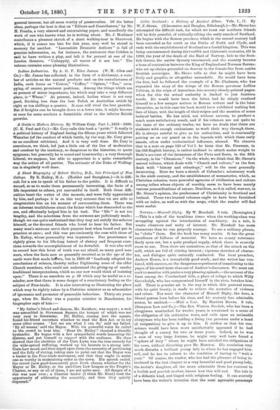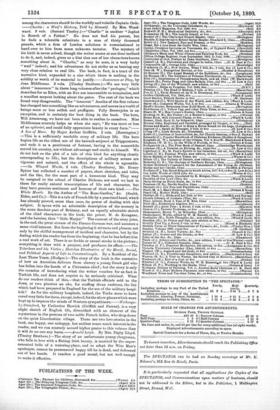NOVELS.—Monsell Digby. By W. Marshall. 3 vols. (Remington.) —This is
a tale of the troublous times when the working-class was struggling against the introduction of machinery. As a tale, it wants clearness and unity of interest. Mr. Marshall has more characters than he can properly manage. To use a military phrase, he "clubs" them. But the book has many merits. It has the great excellence of fullness of material. We have no scanty substance finely spun out, but a quite prodigal supply, which there is scarcely room to use. Then there are narratives, as that of the attack on the mill, which are full of stirring interest ; vigorous sketches of charac- ter, and dialogue quite naturally conducted. The local preacher, Andrew Heron, is a remarkably good study, and the writer has ven- tured, with success, on the dangerous experiment of transferring to the pages of his novel more than one of Andrew's discourses. We mast not omit to mention with praise a very pleasing episode,—the account of the farm among the Cumberland hills, a place of refuge to which Willy Greenhalgh, who has compromised himself in the riots, betakes him- self. There is genuine art in the way in which this pastoral scene, with its quiet beauty, is made to relieve the narrative of violence and crime. Nor must the character of Monsell Digby, the hero, a liberal parson born before his time, and his scarcely less admirable rector, be omitted.—Wait a Year. By Harriett Bowra. 3 vols. (Sampson Low and Co.)—The Rev. Warren Sinclair, who has been a clergyman unattached for twelve years, is awakened to a sense of the obligation of his ordination vows, and calls upon an estimable clergyman who has been holding a living (we presume under a bond of resignation) to give it up to him. It strikes us that his con- science would have been more satisfactorily appeased if he had thought of a curacy for two or three years. Indeed, as he was a man of very large fortune, he might very well have found a " sphere of duty " where he might have satisfied the obligations of his vows, without disturbing poor Mr. Moreton. His resolution very much disturbs a brilliant young lady to whom he has engaged him- self, and he has to submit to the condition of having to "wait a year." Of course, the reader, who has had the pleasure of being in- troduced in the first chapter to a very beautiful and good young lady, the rector's daughter, all the more admirable from her contrast to a foolish and peevish mother, knows how this will end. The tale is of a didactic kind, and tinged with religious feeling. It can scarcely have been the writer's intention that the most agreeable personage among the characters should be the worldly and volatile Captain Orde. —Charlie : a Waif's History, Told by Himself. By Mrs. Wood- ward. 8 vols. (Samuel Tinsley.)--" Charlie " is another " Japhet in Search of a Father." He does not find his parent, but he finds a tolerable substitute in a sum of thirty thousand pounds, which a firm of London solicitors is commissioned to hand over to him from some unknown testator. The mystery of his birth is never solved, though the writer seems at one time inclined to do it, and, indeed, gives us a hint that one of her characters knows something about it. "Charlie," as may be seen, is a very lucky " waif " indeed ; and his adventures do not strike us as bearing any very close relation to real life. The book, in fact, is a tract of the narrative kind, expanded to a size which there is nothing in the solidity or worth of its material to justify.—Innocence at Play, by Jean Middlemas. 3 vols. (Tinsley Brothers.)—We see very little about " innocence " in these long volumes after the "prologue," which describes for us Eden, with an Eve not inaccessible to temptation, and a manifest serpent lurking about the gates. The rest of the book we found very disagreeable. The " innocent " Annika of the first volume has changed into something like an adventuress, and moves in a world of beings more or less selfish and profligate. Telly Brownjohn is an exception, and is certainly the best thing in the book. The hero, Will Armstrong, we have not been able to realise to ourselves. Miss Middlemass scarcely helps as when she says, " He was more or less of an optimist, and could fully appreciate beauty in every form."
A Son of Mars. By Major Arthur Griffiths. 2 vols. (Remington.) —This is a sufficiently readable story of military life. The hero begins life as the eldest son of the barrack-serjeant at Triggeratown, and ends it as a gentleman of fortune, having in the meanwhile served his country, not without advantage and credit to himself. We do not look on the plot of a tale of this kind for anything closely corresponding to life ; but the descriptions of military scenes are vigorous and natural, and the effect of the whole is agreeable. —In Winged Words, 2 vols. (Tinsley Brothers), Mr. Henry Spicer has collected a number of papers, short sketches, and tales, and the like, for the most part of a humorous kind. They may be assigned to the school of Charles Dickens, nor need we look in them for really natural transcriptions of life and character, but they have genuine sentiment and humour of their own kind.—The White Month. By the Author of " The Rose-Garden," &c. (Smith, Elder, and Co.)—This is a tale of French life by a practised hand, which has already proved, more than once, its power of dealing with this subject. It opens with an admirable description of the scenery in the more desolate part of Brittany, and an equally admirable sketch of the chief characters in the book, the priest, M. de Keragnac, and the heroine, then "little Mader." The current of the story joins, in the end, the great stream of the Franco-German war, and assumes a more vivid interest. But from the beginning it attracts and pleases, not only by the skilful management of incident and character, but by the feeling which the reader has from the beginning, that he has before him a real work of art. There is no feeble or casual stroke in the picture ; everything is done with a purpose, and produces its effect.—The Tcherkess and his Victim ; Sketches Illustrative of the Moral, Social, and Political Aspects of Life in. Constantinople. By a Resident of the Last Three Years. (Hodges.)—The story of the book is the narrative of how an American delivers from slavery a young Greek girl who has fallen into the hands of a Circassian chief ; but the story is only the occasion of introducing what the writer vouches for as fact in Turkish life, and does not require to be seriously criticised. What do our readers think of this,—that the Turkish officials sold to the Jews, at two piastres an oke, for stuffing divan cushions, the lint which had been prepared in England for the use of the military hospi- tals ? As for the military hospitals, indeed, the Turks seem to have cared very little for them, except, indeed, for the show-places which were kept up to impress the minds of Western sympathisers.—Wothrope by-Stamford, by Catherine Howick (Griffith and Ferran), is a very slight sketch of English life, diversified with an element of the mysterious in the persons of two noble French ladies, who drop down on the quiet Lincolnshire village. There are two love-stories in the book, one happy, one unhappy, but neither rouse much interest in the reader, and we can scarcely accord higher praise to this volume than it will do no one any harm.—Arnold Leigh. By Mrs. Digby Lloyd. (Tinsley Brothers.)—The story of an unfortunate young clergyman, who falls in love with a flirting Irish beauty, is married by the super- animated belle of a watering-place, and to adopt the Wise Man's apothegm, cannot be pronounced happy till he is dead, and delivered out of her bands. It teaches a good moral, but not well enough to make it effective.



































 Previous page
Previous page